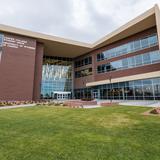School Highlights
National American University-Rapid City serves 1,876 students (16% of students are full-time).
The college's student-teacher ratio of 8:1 is lower than the state community college average of 12:1.
Minority enrollment is 58% of the student body (majority Black), which is more than the state average of 25%.
Quick Facts (2026)
- Enrollment: 1,876 students
- Private-state tuition: $13,287
- Student-teacher ratio: 8:1
- Minority enrollment: 58%
- Source: Integrated Postsecondary Education Data System (IPEDS)
Top Rankings
National American University-Rapid City ranks among the top 20% of public schools in South Dakota for:
Category
Attribute
Diversity
School Overview
The teacher population of 240 teachers has stayed relatively flat over five years.
National American University-Rapid City
(SD) Community College Avg.
Carnegie Classification
Doctoral/Professional Universities
Doctoral/Professional Universities
Institution Level
Four or more years
At least 2 but less than 4 years
Institution Control
Private for-profit
Public
Total Faculty
240 staff
208 staff
Student Body
The student population of National American University-Rapid City has grown by 30% over five years.
The student-teacher ratio of 8:1 has decreased from 13:1 over five years.
The National American University-Rapid City diversity score of 0.73 is more than the state average of 0.43. The school's diversity has grown by 17% over five years.
Total Enrollment
1,876 students
1,321 students
Student-Teacher Ratio
8:1
12:1
# Full-Time Students
295 students
295 students
# Part-Time Students
1,581 students
1,026 students
# Enrollment Undergraduate
155 students
183 students
# Full-Time Undergraduate Students
160 students
160 students
# Full-Time Graduate Students
135 students
135 students
# Part-Time Undergraduate Students
1,399 students
1,026 students
# Part-Time Graduate Students
182 students
182 students
Total Dormitory Capacity
n/a
n/a
% American Indian/Alaskan
2%
3%
% Asian
2%
2%
% Hispanic
15%
5%
% Black
26%
7%
% White
42%
75%
% Hawaiian
1%
2%
% Two or more races
4%
2%
% Non Resident races
n/a
n/a
% Unknown races
7%
4%
Diversity Score
0.73
0.43
College Completion Rate (Students who graduate in less than 4 years)
n/a
58%
College Completion Rate (Students who graduate in 4 years or more than 4 years)
33%
33%
Average Graduate Earnings (10 Years)
$41,200
$38,900
Tuition and Acceptance Rate
The private state tuition of $13,287 is equal to the state average of $13,287. The private state tuition has declined by 11% over four years.
Private State Tuition Fees
$13,287
$13,287
% Students Receiving Some Financial Aid
50%
85%
Median Debt for Graduates
$24,384
$12,000
Median Debt for Dropouts
$12,497
$5,500
Acceptance Rate
n/a
100%
Source: 2024 (or latest year available) Integrated Postsecondary Education Data System (IPEDS)
Frequently Asked Questions
How much does National American University-Rapid City cost?
National American University-Rapid City's private state tuition is approximately $13,287.
What schools are National American University-Rapid City often compared to?
National American University-Rapid Cityis often viewed alongside schools like Western Dakota Technical College by visitors of our site.
What is National American University-Rapid City's ranking?
National American University-Rapid City ranks among the top 20% of community college in South Dakota for: Diversity in US community colleges.
Recent Articles

Community College vs. Bootcamps for Tech Careers in 2026
Community college vs. bootcamps in 2026. Compare cost, outcomes, credentials, and hiring trends to choose the best tech career path.

How to Build a Class Schedule That Fits Your Life (Spring 2026)
Learn how to build a class schedule that fits your life with expert tips, updated strategies for Spring 2026, and practical planning tools for students and families.

Top 10 Jobs for Community College Graduates in 2026
Meta Description: Discover high-demand jobs for community college graduates, with current salary trends, costs, and career pathways.






